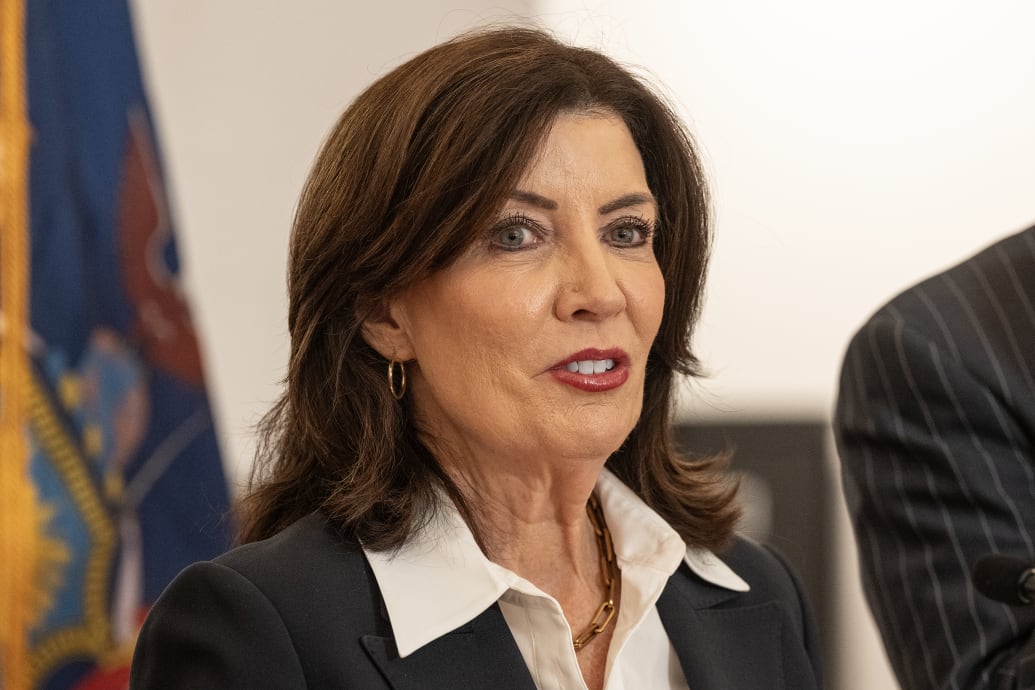See more: New Witness Bill Could Doom Harvey Weinstein at Retrial
The proposed law would allow prior bad acts to be used in sexual assault cases—the kind of evidence an appeals court threw out in the Hollywood mogul’s case.

The reversal of Harvey Weinstein’s rape conviction was a gut punch to the accusers who testified at his trial. But as prosecutors prepare to retry him, a new bill making its way through the New York state legislature could give them a powerful weapon.
The bill, introduced by state Assemblymember Amy Paulin, would allow evidence of prior bad acts to be admitted in sexual assault trials—the kind of evidence that led the New York Court of Appeals to toss out Weinstein’s guilty verdict last month.
Survivors hope the bill would allow witnesses who say Weinstein assaulted them to testify again, even though he is not charged with crimes related to those incidents.
“Weinstein’s conviction being overturned has made me realize that our laws do not consider sexual abuse survivors,” Taralê Wulff, one of the witnesses whose testimony was thrown out, told The Daily Beast. “We must be proactive in addressing these shortcomings in our legal system.”
Paulin, a senior member of the New York State Assembly and a rape survivor, told The Daily Beast she introduced the bill in February 2023 in anticipation of a decision like the one in the Weinstein appeal.
“After we saw that the judge had allowed [this] evidence, we just wanted to be sure that we were covered,” Paulin told the Daily Beast. “I didn’t expect to need the bill, but as it turned out, it was a good thing.”
The bill is in committee and the legislative session ends June 6, but Paulin is hopeful that outrage over the Weinstein decision could push it over the line. The measure has been endorsed by survivors’ rights groups Sanctuary for Families and the Joyful Heart Foundation, and Paulin said the committee chair is supportive and will appear at a press conference for the bill on Thursday.
The original version of the bill would have taken effect 30 days after it was signed into law. An amendment added Thursday would have the bill take effect immediately, with the aim of it being in effect for Weinstein’s trial.
A spokesperson for Gov. Kathy Hochul’s office told The Daily Beast they would review the legislation. Hochul said last week that her office was “analyzing the scale of [the Weinstein] decision, the impact, what it means, and how we can make sure that all women feel safe coming forward, that they can tell what happened to them.”
The Manhattan District Attorney’s office said it is “working hand-in-hand with stakeholders to modernize and clarify New York’s laws pertaining to Molineux evidence so prosecutors around the state can better secure justice for survivors.” They declined to comment on how the bill would affect a retrial.
Weinstein survivors and accusers are rallying around the bill, hoping to get it enacted before the retrial. A coalition holding a press conference Thursday at the New York headquarters of the National Organization for Women includes Ambra Gutierrez, a model who told police that Weintein assaulted her in 2015 but never saw charges filed.
“I was really surprised when the conviction was overturned over the fact that a lot of victims were speaking about their experience,’ Gutteirez told The Daily Beast. “So I just feel and believe firmly that something like this has to be fixed, because it’s really nonsense.”
Guttierez is part of an advocacy group called the Model Alliance, which is pushing for its own bill, the Fashion Workers Act, in Albany this session. The group’s founder, Sara Ziff, filed a sexual assault suit last year accusing former Weinsten associate Fabrizio Lombardo. That case is a civil matter, so the bill would not affect it, but Ziff said the Alliance still saw the legislation as a “no-brainer.”
“I understand from my decade of advocacy and speaking with survivors that perpetrators like Weintsein operate within a system and more often than not there are multiple victims,” Ziff said. “It only makes sense that this be corrected.”
Six women testified in Weinstein’s 2020 trial, at which he was convicted of raping one woman and forcibly performing oral sex on another and was sentenced to 23 years in prison. Three of those women were what is known as Molineux witnesses, who spoke about assaults they said Weinstein committed against them but that did not result in charges.
The 4-3 decision from the appeals court found that those witnesses should not have been allowed to testify, and threw out the disgraced producer’s conviction. He remains in prison for his rape conviction in Los Angeles, and Manhattan prosecutors have promised to retry him for the New York crimes.
Allowing for Molineux witnesses in New York criminal trials could bolster the case against Weinstein and other sexual assault cases in the state. Sixteen states currently allow for such evidence to be admitted at trial, and several others allow it in specific instances.

Jane Manning, a former sex crimes prosecutor and supporter of the bill, says this kind of evidence is especially important in cases like Weinstein’s, where the alleged crime happened behind closed doors.
“[These trials] will often rely heavily on the testimony of the survivor, and all those dynamics of rape victims—victim blaming and rape myths and and reflexive disbelief—will come into play,” she said. “Allowing the voices of other survivors to be heard during a trial, it just offers a little leveling of the field.”
She added that the five and a half days that jurors took to deliberate on Weintein’s case, as well as their decision to acquit him on some charges, showed the testimony of prior bad act witnesses did not overly bias the jury.
“This kind of evidence is really relevant, it’s really probative, and I think jurors have shown they can handle it and give it the correct amount of weight,” she said.


